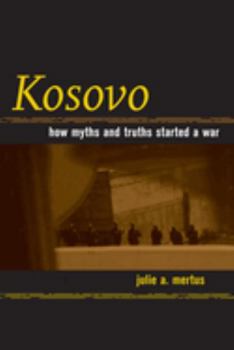Kosovo: How Myths and Truths Started a War
Select Format
Select Condition 
Book Overview
In one of the first comprehensive looks at the explosive situation in Kosovo, a law professor explores the years leading to the war, demonstrating how myths and truths can start ethnic conflicts. 18 photos. 2 maps.
Format:Paperback
Language:English
ISBN:0520218655
ISBN13:9780520218659
Release Date:August 1999
Publisher:University of California Press
Length:400 Pages
Weight:1.25 lbs.
Dimensions:1.0" x 6.0" x 9.0"
Customer Reviews
5 ratings
Balanced and Thought Provoking
Published by Thriftbooks.com User , 16 years ago
While living in Kosovo, I read several books to try to understand the current situation. Most are relatively dry historical accounts which don't seem to adequately explain the tensions. Mertus has a unique approach which uses first hand reactions of both Serbs and Albanians to certain events in the 80s and 90s. From these accounts, you see how each group can view the same events with different eyes and use events to fan flames of hatred against the other side. It is clear how the tension developed to boiling point in the 90s. It also helped me to understand the riots of March 2004. The book is easy to read and does not require previous knowledge of the region. I would recommend it as the key book for anyone with dealings in Kosovo. Mertus ends the book with recommendations for NGOs working for reconciliation in Kosovo.
A bedtime story
Published by Thriftbooks.com User , 23 years ago
So, Slobodan Milosevic has been toppled.. Guess that means all will now be peaceful in Kosovo!Well, no, actually..and this book will tell you why.Written just before NATO's 1999 air campaign over Kosovo, Julie Mertus illuminates the process by which trust between Serbs and Kosovars became impossible. It hints at Phillip Gourevitch's reflection that "power comes when you convince your enemy to inhabit YOUR version of HIS story".That struggle, each wanting the "correct" version of history to stand, lies at the heart of all Balkan conflicts of the last ten years.Through innumerable interviews with the ordinary people of Kosovo, Serbian and Albanian, Julie Mertus reveals how competing myths came to be, and how they then contributed to an environment where terrorism and atrocity became - ultimately - a logical choice.She does not go back to the mythology surrounding the 1389 defeat of the Serbian Prince Lazar at Kosovo Polje - the rallying point for Milosevic. (Covered already in Noel Malcolm's "Kosovo: A Short History). Mertus shows how events within our generation created defining national stories.Two quick examples.In 1990, thousands of schoolchildren fell ill. The ethnic Albanian understanding: they were deliberately poisoned, probably with Sarin gas, by Serbian authorities. It was proof of the evil Serbs would be willing to do to Albanians. The UCK (Kosovo Liberation Army) recruited youths with the argument that without resistance, they would all be poisoned again.The Serb response to the same event was that it was mass hysteria at best, or at worst a deliberate plot by ethnic Albanians to generate international sympathy against them, the Serbs. It proved the extent of the Kosovars' untrustworthiness, their deviousness. There could be no common ground between those views. Which story you believed, defined you.Similarly, there is the case of Djordje Martinovic, a Serbian peasant who turned up at hospital with a bottle in his rectum and a story about being assaulted in his field by "masked men". Although later apparently recanting his story, and confessing his "assault" had been a botched act of self-gratification, for Serbs it became a rallying point. Dismissing the recantation as an Albanian plot, Serbs were only too happy to believe that this, the violation of an honest peasant in an act with echoes of the old Turkish practice of impaling, was the extent to which ethnic Albanians would not hesitate to stoop. Martinovic quickly returned to his original story. He remains on the list of Serb martyrs to this day.Today, Kosovo remains in an effective state of partition, nearly all its former Serb population living above the divided city of Mitrovica. Without the presence of KFOR troops, armed conflict would be inevitable. It is not their religion, or even their language, that divides Serb from Kosovar. It is the incompatability of the stories they tell. Since this book was written, both sides have volumes of fresh grievances, accentuating their enemy
a wonderful book that will cause a person to think.
Published by Thriftbooks.com User , 24 years ago
Julie Mertus has done a fine job of writing from her on the spot investigations of what she found during her interviews.
Fantastic
Published by Thriftbooks.com User , 24 years ago
This is an utterly fantastic book. It gives faces to the conflict in Kosovo. Ms. Mertus does a fantastic job of describing the underlying causes of Kosovo. This is not a history book. This is a focus on the modern causes, the modern "Truths" which caused the slaughter and the hatred. Absolutely phenomenal. You won't find another book giving this much information on the mindset of the local population. This book deserves 10 stars.
This book is facinating. I could not put it down!
Published by Thriftbooks.com User , 24 years ago
This book is exceptional in the clarity of the author's thinking. It not only forces the reader to confront the myths surrounding the Kosovo situation but also invites one to apply the writer's perceptiveness and logic to the myths prevailing in the reader's country, wherever he or she may live. The author's personal encounters with the people of Kosovo add a poignancy to her analysis that is all the more compelling in light of the current happenings there. I could not put it down until I finished it.




